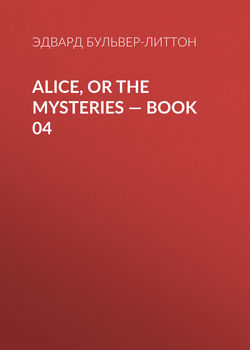Читать книгу Alice, or the Mysteries — Book 04 - Эдвард Джордж Бульвер-Литтон, Эдвард Бульвер-Литтон - Страница 3
BOOK IV CHAPTER III
ОглавлениеALSE from that forked hill, the boasted seat
Of studious Peace and mild Philosophy,
Indignant murmurs mote be heard to threat.
—WEST.
MR. CLEVELAND wanted to enrich one of his letters with a quotation from Ariosto, which he but imperfectly remembered. He had seen the book he wished to refer to in the little study the day before; and he quitted the library to search for it.
As he was tumbling over some volumes that lay piled on the writing-table, he felt a student's curiosity to discover what now constituted his host's favourite reading. He was surprised to observe that the greater portion of the works that, by the doubled leaf and the pencilled reference, seemed most frequently consulted, were not of a literary nature,—they were chiefly scientific; and astronomy seemed the chosen science. He then remembered that he had heard Maltravers speaking to a builder, employed on the recent repairs, on the subject of an observatory. "This is very strange," thought Cleveland; "he gives up literature, the rewards of which are in his reach, and turns to science, at an age too late to discipline his mind to its austere training."
Alas! Cleveland did not understand that there are times in life when imaginative minds seek to numb and to blunt imagination. Still less did he feel that, when we perversely refuse to apply our active faculties to the catholic interests of the world, they turn morbidly into channels of research the least akin to their real genius. By the collision of minds alone does each mind discover what is its proper product: left to ourselves, our talents become but intellectual eccentricities.
Some scattered papers, in the handwriting of Maltravers, fell from one of the volumes. Of these, a few were but algebraical calculations, or short scientific suggestions, the value of which Mr. Cleveland's studies did not enable him to ascertain; but in others they were wild snatches of mournful and impassioned verse, which showed that the old vein of poetry still flowed, though no longer to the daylight. These verses Cleveland thought himself justified in glancing over; they seemed to portray a state of mind which deeply interested, and greatly saddened him. They expressed, indeed, a firm determination to bear up against both the memory and the fear of ill; but mysterious and hinted allusions here and there served to denote some recent and yet existent struggle, revealed by the heart only to the genius. In these partial and imperfect self-communings and confessions, there was the evidence of the pining affections, the wasted life, the desolate hearth of the lonely man. Yet so calm was Maltravers himself, even to his early friend, that Cleveland knew not what to think of the reality of the feelings painted. Had that fervid and romantic spirit been again awakened by a living object? If so, where was the object found? The dates affixed to the verses were most recent. But whom had Maltravers seen? Cleveland's thoughts turned to Caroline Merton, to Evelyn; but when he had spoken of both, nothing in the countenance, the manner, of Maltravers had betrayed emotion. And once the heart of Maltravers had so readily betrayed itself! Cleveland knew not how pride, years, and suffering school the features, and repress the outward signs of what pass within. While thus engaged, the door of the study opened abruptly, and the servant announced Mr. Merton.
"A thousand pardons," said the courteous rector. "I fear we disturb you; but Admiral Legard and Lord Doltimore, who called on us this morning, were so anxious to see Burleigh, I thought I might take the liberty. We have come over quite in a large party,—taken the place by storm. Mr. Maltravers is out, I hear; but you will let us see the house. My allies are already in the hall, examining the armour."
Cleveland, ever sociable and urbane, answered suitably, and went with Mr. Merton into the hall, where Caroline, her little sisters, Evelyn, Lord Doltimore, Admiral Legard, and his nephew were assembled.
"Very proud to be my host's representative and your guide," said Cleveland. "Your visit, Lord Doltimore, is indeed an agreeable surprise.
Lord Vargrave left us an hour or so since to call on you at Admiral Legard's: we buy our pleasure with his disappointment."
"It is very unfortunate," said the admiral, a bluff, harsh-looking old gentleman; "but we were not aware, till we saw Mr. Merton, of the honour Lord Vargrave has done us. I can't think how we missed him on the road."
"My dear uncle," said Colonel Legard, in a peculiarly sweet and agreeable tone of voice, "you forget we came three miles round by the high road; and Mr. Merton says that Lord Vargrave took the short cut by Langley End. My uncle, Mr. Cleveland, never feels in safety upon land, unless the road is as wide as the British Channel, and the horses go before the wind at the rapid pace of two knots and a half an hour!"
